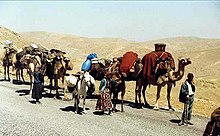Yuruks
 |
|
| Regions with significant populations | |
|---|---|
| Anatolia, Balkans | |
| Languages | |
| Turkish | |
| Religion | |
| Sunni Islam and Alevism | |
| Related ethnic groups | |
| Turkish people and other Turkic peoples |
The Yörüks, also Yuruks or Yorouks (Turkish: Yörükler; Greek: Γιουρούκοι, Youroúkoi; Bulgarian: юруци; Macedonian: Јуруци, juruci), are a Turkish ethnic group, some of whom are nomadic, primarily inhabiting the mountains of Anatolia, and partly in the Balkan peninsula. Their name derives from the Turkish verb yürü- (yürümek in infinitive), which means "to walk", with the word yörük or yürük designating "those who walk on the hindlegs, walkers". Yörüks lived within the Yörük Sanjak (Turkish: Yörük Sancağı) which was not a territorial unit like other sanjaks but a separate organisational unit of the Ottoman Empire.
Historians and ethnologists often use the additional appellative 'Yörük Turcoman' or 'Turkmens' to describe the Yörüks of Anatolia. In Turkey's general parlance today, the terms "Türkmen" and "Yörük" indicate the gradual degrees of preserved attachment with the former semi-nomadic lifestyle of the populations concerned, with the "Turkmen" now leading a fully sedentary life, while keeping parts of their heritage through folklore and traditions, in arts like carpet-weaving, with the continued habit of keeping a yayla house for the summers, sometimes in relation to the Alevi community etc. and with Yörüks maintaining a yet stronger association with nomadism. These names ultimately hint to their Oghuz Turkish roots. The remaining transhumant or "true" Yörüks of today's Anatolian region traditionally use the camel as a means of transportation, though these are steadily being replaced by trucks.
...
Wikipedia
